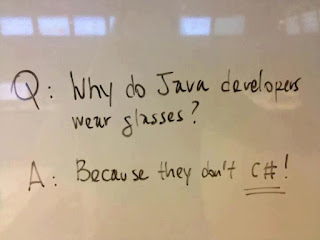Application Development in Java and C#
Brief similarity
Both C# and Java Are Object-Oriented Languages
Both C# and Java are designed from the ground up as object-oriented languages using dynamic dispatch, with syntax similar to C++ (C++ in turn derives from C). Neither language is a superset of C or C++, however, any class in either language implicitly (or explicitly) subclasses an object. This is a very nice idea, because it provides a default base class for any user-defined or built-in class.Covariance and contravariance
Covariance and contra variance is supported by both languages. Java has use-site variance that allows a single generic class to declare members using both co- and contravariance. C# has define-site variance for generic interfaces and delegates. Variance is not supported directly on classes but is supported through their implementation of variant interfaces. C# also has use-site covariance support for methods and delegates.Garbage Collection
Garbage collection which simply is automatic memory management, both languages allows automatic reclaiming of memory from objects that are out of scope.
Comparison table
Native interoperability Java C#
Cross-language interoperability Yes Yes
External/native methods Yes Yes
Marshalling External glue code required Yes metadata controlled
Pointers and arithmetic***** No Yes
Native types Yes Yes
Fixed-size buffers No Yes
Explicit stack allocation No Yes
Address-of No Yes
Object pinning (fix variable to address) No Yes
Metadata Java C#
Metadata annotations/attributes Interface based; user-defined annotations can be created Class based
Positional arguments No; unless a single argument Yes
Named arguments Yes Yes
Default values At definition Through initialization
Nested types Yes Yes
Specialization No Yes
Conditional metadata No Yes
Class access specifies Only One public class in file to compile Multiple public classes allowed in same file to compile.
#region keyword* Yes No
Native code calls** Yes; with JNI Yes; using platform Invoke
Conditional compilation*** Yes using preprocessor directives No
Runtime Environment**** Yes; JRE Yes; CLR
Extensions Yes Yes
Single-Line comments(//) Yes Yes
Double-Line comments(/*...*/) Yes Yes
Platform support Java C#
Linux Yes via Mono
Mac OS X Yes via Mono
Solaris Yes via Mono
FreeBSD Yes via Mono
AIX Yes Partial?
iOS via RoboVM or Codename One via Mono
Windows Yes Yes
Windows Mobile Yes Yes
Windows Phone via Codename One Yes
Windows 8 Modern Yes Yes
Android via Dalvik, ART via Mono
Feature phones Yes No
Symbian Yes Deprecated
Blackberry Yes via cross-compiler


Comments
Post a Comment